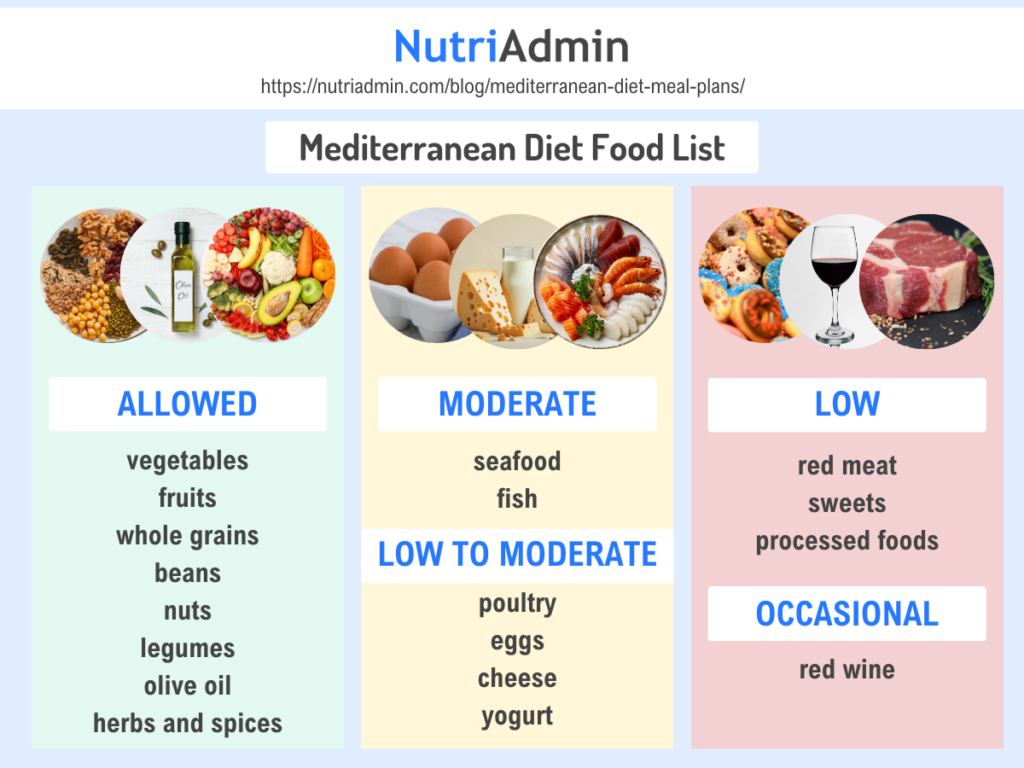Did you know that the Mediterranean Diet was ranked number 1 in the Best Diet Overall in 2024 by the U.S. News & World Report? Do you want to find out the secret behind this diet recommended by nutrition and health professionals? In this article, let’s find out what makes the Mediterranean diet so popular and how it can benefit your clients. Plus, we’ll include a free printable 7-day Mediterranean diet meal plan and recipe ideas.
What is the Mediterranean Diet
The Mediterranean Diet is a traditional eating pattern that originates from the people living along the Mediterranean coast. This includes countries like Italy, Spain, Greece, France, and Morocco.
The Mediterranean Diet can vary depending on the region, but there are general foods that are typically included. It is rich in fruits, vegetables, whole grains, legumes, and olive oil.
It also includes moderate amounts of fish and poultry. Additionally, it incorporates red wine in moderation. This diet is known for its health benefits due to the high consumption of plant-based foods and healthy fats.
In addition to the diet, the Mediterranean lifestyle also involves recommendations such as staying active, getting enough rest, and the social aspect of sharing meals with others.
Benefits of Mediterranean Diet Meal Plans
For seven years, the Mediterranean diet has consistently been ranked as the top diet in terms of nutritional completeness, health risks and benefits, long-term sustainability, and evidence-based effectiveness. In this section, we will explore some of its notable health benefits.
Cardiovascular Health
According to a study in 2019, following the Mediterranean diet is associated with reduced rates of coronary heart disease, ischemic stroke, and other cardiovascular diseases.
The American Heart Association recommends the Mediterranean Diet because it emphasizes vegetables, fruits, whole grains, beans, and legumes. The diet’s lower intake of dairy, red meat, highly processed foods, and added sugars also contributes to this.
Following this diet can help individuals achieve the AHA’s recommended dietary pattern. This pattern plays a significant role in preventing heart disease and stroke and reducing risk factors such as obesity, diabetes, high cholesterol, and high blood pressure.
Type 2 Diabetes
A 2020 research review showed that following a Mediterranean diet is consistently linked to a reduced risk of developing type 2 diabetes.
Additionally, many studies have repeatedly shown that the Mediterranean diet positively affects diabetes. It reduces HbA1c levels, improves diabetic dyslipidemia, and aids in weight loss, making it a valuable part of type 2 diabetes treatment.
The diet’s impact on diabetes-related mechanisms includes anti-inflammatory and antioxidant effects, hormonal actions, and changes in gut microbiota.
Bone Health
Adherence to the Mediterranean Diet has been shown to positively impact bone mineral density, muscle mass, and physical function while also helping to prevent osteoporosis and sarcopenia. This diet is being considered as a potential therapeutic approach to delaying the onset of these conditions.
In a study in 2023, there has been some evidence supporting the potential benefits of adopting a Mediterranean diet in reducing the risk of hip fractures among older adults.
Gut Health
The Mediterranean diet’s diverse nature, which promotes consuming foods rich in fiber, vitamins, minerals, and healthy fats, indicates its potential benefits for gut health.
In a recent study, it showed that individuals who follow the Mediterranean diet tend to have higher levels of beneficial bacteria in their gut. The diet also involves reducing the intake of red meat, which is linked to less beneficial gut microorganisms for health.
Mental Health
Many studies in different populations have linked the Mediterranean diet to positive effects on mental health. Some studies have also shown its positive effect on alleviating symptoms of depression and anxiety.
A study published in Nutrition Reviews found that adhering to the Mediterranean diet may help protect the mental health of children and teenagers. This means that encouraging a Mediterranean diet could help reduce the chance of developing psychiatric symptoms, lessen symptom severity, and improve the prognosis for young patients.
According to a study examining the effects of following the Mediterranean diet on reducing depressive symptoms in adults, significant potential exists for alleviating depressive symptoms in young and middle-aged adults experiencing major or mild depression.
A study in South Korea found that adherence to the Mediterranean diet was associated with lower rates of depression. This research suggests that following the Mediterranean diet can help prevent symptoms of depression and support positive mental health in the South Korean population.
According to a recent study published in the British Journal of Nutrition study, following the Mediterranean diet and a high fish intake was associated with lower depressive symptoms in older women.
Disadvantages of the Mediterranean Diet
Potential for overeating and weight gain
Although the Mediterranean diet promotes a variety of nutritious foods, it lacks specific guidance on portion sizes and quantities. This could potentially result in overeating and subsequent weight gain. To prevent overconsumption while still enjoying the benefits of the Mediterranean diet, it’s advisable to practice mindful eating. Additionally, be attentive to hunger signals and exercise portion control.
Can be expensive
Some key components of the Mediterranean diet, like fresh fish, olive oil, and certain fruits and vegetables, can be expensive. To manage costs, consider opting for more affordable options like plant-based proteins, frozen fish, and locally available, in-season fruits and vegetables. Shopping at local markets and planning meals ahead can also help control expenses.
Mediterranean Diet Meal Plan Food List
Understanding the components of the Mediterranean diet is important in planning the Mediterranean diet meals. This will help you gather ideas for food items and dishes that you can incorporate into your Mediterranean meal plans.
This can also serve as a guide to determine which foods your clients can eat regularly. It can also help identify which ones need to be consumed moderately.

Protein
The Mediterranean diet includes a variety of protein sources, focusing on lean proteins. Fish and seafood, particularly in coastal regions, are essential. They emphasize fatty fish like salmon, sardines, and mackerel, which are rich in omega-3 fatty acids.
Legumes like beans, lentils, and chickpeas provide fiber, a range of vitamins, and minerals. They also serve as an important protein source. Nuts and seeds also provide protein and are high in healthy fats.
Poultry, eggs, and dairy products such as yogurt and cheese are also part of the diet in moderation. Compared to other protein sources, people eat red meat less often and in smaller amounts in this diet.
Carbohydrates
The Mediterranean diet’s carbohydrates mainly come from whole grains, fruits, vegetables, and legumes. These complex carbohydrates provide a steady energy source and are packed with fiber, vitamins, and minerals. The diet emphasizes whole, unprocessed foods and limits refined sugars.
Fats and Oils
The Mediterranean diet focuses on consuming healthy fats, such as olive oil, as the main source of fat. Other sources of healthy fats include nuts, seeds, and fatty fish. The diet also promotes reducing the intake of saturated fats from sources like red meat.
Mediterranean Diet Meal Plan
You may have been impressed by the many benefits the Mediterranean diet meal plan can offer. If you’re wondering how to create a Mediterranean meal plan, you can refer to the example below from NutriAdmin‘s meal plan generator for meal ideas.
In the day-to-day work of a nutritionist, coach, or personal trainer, creating numerous meal plans can be a time-consuming task. Fortunately, there are meal planning software solutions available to streamline this process.
If you are creating Mediterranean Diet meal plans for your clients, you should select an app that offers recipe options in line with the Mediterranean Diet requirements.
For instance, the meal plan generator feature in NutriAdmin comes equipped with a Mediterranean Diet filter. This feature allows users to quickly generate a wide variety of customized Mediterranean meal plans with recipes, providing hundreds of options in just 60 seconds.
If you want to check out other meal planning apps, you can visit our NutriAdmin alternatives and comparisons page to find the best Mediterranean diet app that you can use in your business.
Mediterranean Diet Meal Recipes
Looking for more Mediterranean meal recipe ideas? I’ve generated additional Mediterranean diet-inspired recipes below from our nutritionist-vetted recipes database. You can use these delicious and easy-to-make recipes to incorporate Mediterranean diet meals into your clients’ meal plans.
Summary
The Mediterranean diet offers numerous health benefits and has consistently ranked as the best diet by nutrition and health professionals. This eating pattern focuses on fruits, vegetables, whole grains, legumes, and olive oil. Moderate amounts of fish and poultry are also included in the diet.
Mediterranean diet meal plans can improve cardiovascular health, reduce the risk of type 2 diabetes, and promote better bone and gut health. Additionally, it may have positive effects on mental health.
Mediterranean diet meal recipes are diverse and delicious, incorporating a wide range of ingredients and flavors. From colorful salads to savory fish dishes, there are countless Mediterranean diet ideas you can try. These meals are not only nutritious but also enjoyable, making it easier to stick to the diet long-term.
While the Mediterranean diet is generally beneficial for many people, it’s important to remember that individualized diets are still best. For individuals with specific health conditions, it’s important to consult a nutrition professional before making significant changes to your diet.
Start incorporating Mediterranean diet meals into your clients’ meal plans today to help them enjoy this eating pattern’s numerous health benefits. By providing delicious and nutritious Mediterranean diet meal plans, you can help your clients achieve their goals while enjoying a diverse and flavorful range of foods.




